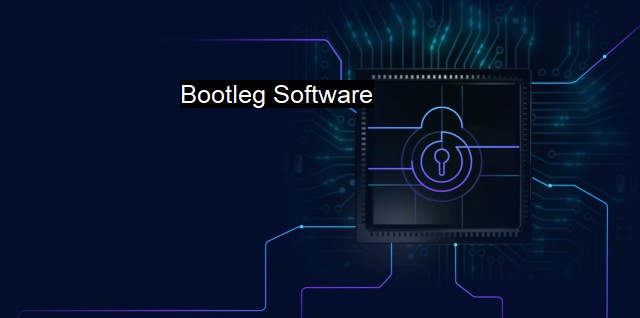What is Bootleg Software?
Beware of Bootleg Software: The Real Cost of Cheap Substitutes in Cybersecurity
"Bootleg Software" refers to unauthorized or illegal copies of software that are frequently sold or distributed without the knowledge or permission of the original manufacturer or copyright holder. Using or distributing bootleg software is illegal and often punishable under copyright laws.Bootleg software poses a significant threat not only to the revenues of legitimate software producers but also to the cybersecurity of users. The proliferation of bootleg software has risen concurrently with the growth of the internet. Many users worldwide access and download bootleg software from online platforms without understanding the inherent cybersecurity risks they are exposed to.
Regarding the cybersecurity aspect, bootleg software is a prolific source of malware infections. Malware, short for malicious software, refers to any software designed to harm or exploit any network, service, or computing device. A user installing bootleg software unknowingly exposes their computing device to a potential malware attack. Risks range from simple adware to dangerous ransomware that can lock the user out from accessing their data.
Bootleg software often comes with sophisticated cyber threats that are undetectable by most antivirus solutions. some bootleg versions are embedded with rootkits, which are usually designed to hide the existence of certain processes or programs from typical antivirus detection methods and gain administrative control of a computer system.
Bootleg software can also come coupled with spyware, posing another serious cybersecurity risk. Spyware may track and share details of users' online habits, steal personal information, or even gather sensitive information such as usernames and passwords. Identity theft is a common outcome of this intrusion, leading to severe financial and personal consequences.
On top of direct cybersecurity risks, the use of bootleg software indirectly increases system vulnerability by denying access to important updates and patches that manufacturers distribute to their legitimate software users. These updates often come with crucial performance improvements, bug fixes, and security updates which are necessary to combate emerging cyber threats.
The role of antivirus software, then, is significantly undermined when dealing with bootleg software. Most antivirus software is designed to work in concert with legitimate, trustworthy software systems, where known networks and infrastructural standards are followed. They don't anticipate, and are hence ill-equipped to handle, the high levels of threats embedded in bootleg software networks.
When bootleg software is installed in a system, it normally disables the automatic update feature. Such actions often leave antivirus programs redundant and, in the worst-case scenario, the unauthorized software may even disable the antivirus software altogether opening the system to various cyberattacks.
Tech support is usually non-existent with bootleg software. This isolation further drives higher susceptibility to deeper, underlying cybersecurity threats, with users having limited channels to report, detect, or resolve problems.
While the allure of getting software for free or at significantly reduced prices is tempting, the use of bootleg software has serious, far-reaching cybersecurity implications that render antivirus efforts largely ineffective. It not only contradicts moral and legal guidelines but also constitutes a significant risk to personal, organizational, and even national cybersecurity. The only real defence against such risks is vigilance and strict adherence to using legitimately obtained software, even though it may come with a price tag.

Bootleg Software FAQs
What is bootleg software and is it safe to use?
Bootleg software refers to unauthorized software copies, which are often illegal and can pose security risks. These copies may be infected with malware or have hidden vulnerabilities that can be exploited by cybercriminals. It is not safe to use such software, as it can compromise the security of your system and personal data.How can I avoid downloading bootleg software?
To avoid downloading bootleg software, always ensure that you download from reputable sources, such as official websites and app stores. Avoid downloading from peer-to-peer networks or other untrustworthy sources. Use an antivirus program to scan all downloaded files to check for potential malware.What are the risks of using bootleg antivirus software?
Using bootleg antivirus software can be extremely dangerous, as it may not provide adequate protection against viruses and malware. In fact, bootleg antivirus software can be malware in disguise, designed to steal your personal information or infect your system with additional malware. It is always recommended to use licensed and reputable antivirus software.Is it legal to use bootleg software?
No, it is not legal to use bootleg software, as it infringes on copyright laws and intellectual property rights. Using bootleg software can result in civil and criminal penalties, including fines and even imprisonment. It is always recommended to use licensed and legitimate software to avoid any legal consequences.| | A | | | B | | | C | | | D | | | E | | | F | | | G | | | H | | | I | | | J | | | K | | | L | | | M | |
| | N | | | O | | | P | | | Q | | | R | | | S | | | T | | | U | | | V | | | W | | | X | | | Y | | | Z | |
| | 1 | | | 2 | | | 3 | | | 4 | | | 7 | | | 8 | | |||||||